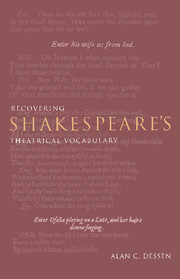Book contents
- Frontmatter
- Contents
- Preface
- Note on texts and old spelling
- 1 The problem, the evidence, and the language barrier
- 2 Lost in translation
- 3 Interpreting without a dictionary
- 4 Juxtapositions
- 5 Theatrical italics
- 6 Sick chairs and sick thrones
- 7 Much virtue in as
- 8 The vocabulary of “place”
- 9 “Romeo opens the tomb”
- 10 Vanish and vanishing
- Conclusion: So what?
- Notes
- Plays and editions cited
- Index
3 - Interpreting without a dictionary
Published online by Cambridge University Press: 07 May 2010
- Frontmatter
- Contents
- Preface
- Note on texts and old spelling
- 1 The problem, the evidence, and the language barrier
- 2 Lost in translation
- 3 Interpreting without a dictionary
- 4 Juxtapositions
- 5 Theatrical italics
- 6 Sick chairs and sick thrones
- 7 Much virtue in as
- 8 The vocabulary of “place”
- 9 “Romeo opens the tomb”
- 10 Vanish and vanishing
- Conclusion: So what?
- Notes
- Plays and editions cited
- Index
Summary
“There's a double meaning in that.”
Much Ado About Nothing, 2.3.237To return to my basic assumptions, in putting quill to paper Shakespeare was crafting theatrical scripts rather than literary texts; the stage directions and other signals in those scripts were directed not at us but at players, playgoers, and readers who shared a language of the theatre easily lost or obscured today. As a result, what to an editor's eye may appear an error or an inconsistency (Malvolio's early entrance, Titania's always, Richard II's “ I, no; no, I”), to a theatrical eye (then or now) may provide a potentially meaningful option. The many silences, moreover – whether about the use of the stage doors, conceptual doubling, or patterned costuming (as with Othello's possible nightgown in 2.3) – may also cloak images or effects highly visible in the original productions.
To recover or reconstitute those images and effects today, however, can be difficult, sometimes impossible. As an instructive paradigm, consider the even greater hurdles that confront the scholar who seeks to recover what the original playgoers saw at a performance of a Greek tragedy (for which no stage directions survive). At the moment when the messenger from Corinth tells Oedipus about his true origins, how did the (male) actor (wearing a mask) act out Jocasta's presumably silent reaction (she has no lines until later in the episode) in front of 10,000 spectators sitting outdoors in the daylight on a hillside?
- Type
- Chapter
- Information
- Recovering Shakespeare's Theatrical Vocabulary , pp. 39 - 63Publisher: Cambridge University PressPrint publication year: 1995



